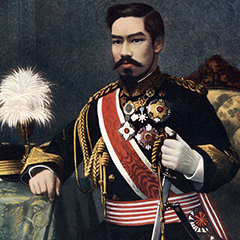The Empire of Japan was the historical nation-state and great power that existed from the Meiji Restoration in 1868 to the enactment of the 1947 constitution of modern Japan.
 Japan's rapid industrialization and militarization under the slogan Fukoku Kyōhei (Enrich the Country, Strengthen the Armed Forces) and Shokusan Kōgyō (Promote Industry) led to its emergence as a world power and the establishment of a colonial empire following the First Sino-Japanese War, the Boxer Rebellion, the Russo-Japanese War, and World War I. Economic and political turmoil in the 1920s led to the rise of militarism, eventually culminating in Japan's membership in the Axis alliance and the conquest of a large part of the Asia-Pacific in World War II.
Japan's rapid industrialization and militarization under the slogan Fukoku Kyōhei (Enrich the Country, Strengthen the Armed Forces) and Shokusan Kōgyō (Promote Industry) led to its emergence as a world power and the establishment of a colonial empire following the First Sino-Japanese War, the Boxer Rebellion, the Russo-Japanese War, and World War I. Economic and political turmoil in the 1920s led to the rise of militarism, eventually culminating in Japan's membership in the Axis alliance and the conquest of a large part of the Asia-Pacific in World War II.
Japan's armed forces initially achieved large-scale military successes during the Second Sino-Japanese War (1937–1945) and the Pacific War. However, after many Allied victories and following the Soviet Union's declaration of war against Japan on August 9, 1945, and subsequent invasion of Manchuria and other territories, and the atomic bombings of Hiroshima and Nagasaki, the Empire surrendered to the Allies on August 15, 1945. A period of occupation by the Allies followed, and a new constitution was created with American involvement in 1947, officially bringing the Empire of Japan to an end. Occupation and reconstruction continued until 1952, eventually forming the current nation-state whose full title is the "State of Japan" in Japanese (simply rendered "Japan" in English).
The Emperors during this time, which spanned the entire Meiji and Taishō, and the lesser part of the Shōwa era, are now known in Japan by their posthumous names, which coincide with those era names: Emperor Meiji (Mutsuhito), Emperor Taishō (Yoshihito), and Emperor Shōwa (Hirohito). More details
 Japan's rapid industrialization and militarization under the slogan Fukoku Kyōhei (Enrich the Country, Strengthen the Armed Forces) and Shokusan Kōgyō (Promote Industry) led to its emergence as a world power and the establishment of a colonial empire following the First Sino-Japanese War, the Boxer Rebellion, the Russo-Japanese War, and World War I. Economic and political turmoil in the 1920s led to the rise of militarism, eventually culminating in Japan's membership in the Axis alliance and the conquest of a large part of the Asia-Pacific in World War II.
Japan's rapid industrialization and militarization under the slogan Fukoku Kyōhei (Enrich the Country, Strengthen the Armed Forces) and Shokusan Kōgyō (Promote Industry) led to its emergence as a world power and the establishment of a colonial empire following the First Sino-Japanese War, the Boxer Rebellion, the Russo-Japanese War, and World War I. Economic and political turmoil in the 1920s led to the rise of militarism, eventually culminating in Japan's membership in the Axis alliance and the conquest of a large part of the Asia-Pacific in World War II.Japan's armed forces initially achieved large-scale military successes during the Second Sino-Japanese War (1937–1945) and the Pacific War. However, after many Allied victories and following the Soviet Union's declaration of war against Japan on August 9, 1945, and subsequent invasion of Manchuria and other territories, and the atomic bombings of Hiroshima and Nagasaki, the Empire surrendered to the Allies on August 15, 1945. A period of occupation by the Allies followed, and a new constitution was created with American involvement in 1947, officially bringing the Empire of Japan to an end. Occupation and reconstruction continued until 1952, eventually forming the current nation-state whose full title is the "State of Japan" in Japanese (simply rendered "Japan" in English).
